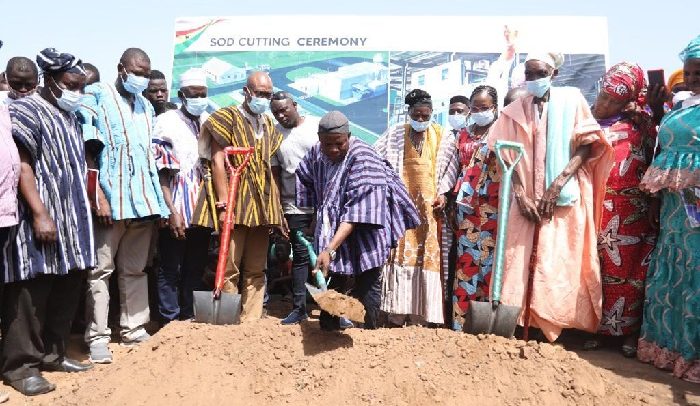The Northern Regional Minister cutting the sod
Work has commenced on the construction of a €20-million solid waste plant as well as a liquid waste treatment plant for the people of the Northern Region.
While the solid waste plant is expected to be completed within four months, the liquid waste facility will be ready in 12 months.
It follows the sod-cutting ceremony performed on behalf of President Akufo-Addo by the Northern Regional Minister, Salifu Saeed, at Gbalahi—a suburb of Tamale and where the two facilities will be sited.
Speaking through Salifu Saeed, the President said the projects were a result of the reigning peace in Dagbon and for that matter the whole of the region.
He explained that the completion of the projects would improve sanitation in the region, saying that poor sanitation goes with loads of health-related problems.
“It will further support the government’s drive to tackle the sanitation problems in the country,” the President said through the minister.
The President said part of the waste would be turned into compost to enable farmers to produce more food under the Planting for Food and Jobs programme.
President Akufo-Addo reiterated his government’s commitment to partner with the private sector to tackle sanitation problems in the country.
For her part, the Chief Operations Officer (COO) of Jospong Group, Florence Larbi, who also doubles as the Managing Director (MD) of Zoomlion Ghana Limited, said recycling plastic waste would help prevent indiscriminate disposal of waste.
“We, as the leading waste management company in Ghana and other parts of Africa, will continue to contribute our quota to make his vision for this sector a reality,” she assured.
She said the solid waste plant is a 200-tonne waste treatment facility and it aims to provide a sustainable solution to recover and recycle over 60 per cent of the organic fraction of the waste into compost.”
“Other recyclable materials will also be separated and processed for reuse,” she indicated.
This treatment plant, Mrs. Larbi said, presents the most “suitable alternative to landfill waste disposal, using the latest technologies in sanitation management”, adding that “presently the region generates 183,000 tons of waste annually, most of which go into landfills making it hazardous to residents. The facility has the potential of curbing this menace.”
According to her, the Tamale waste water treatment plant will process about 1000 cm3 of liquid waste per day.
“Although the liquid waste generated in Tamale currently is between 400 to 500 cm3 (cubic meters ) per day, our aim is to build to a capacity that will serve Tamale and the surrounding MMDAS like Savelugu Municipal, Nantong District, Tolon District, Kumbumgu District, Mion District and beyond,” she disclosed.
Mrs. Larbi used the opportunity to commend the Minister of Sanitation & Water Resources, Cecilia Abena Dapaah, and their partners, Komptech from Austria.
From Eric Kombat, Tamale

